A different view point...
 The
debate about whether Advanced dogs should be able to compete in Intermediate classes was going
on way before the Kennel Club announced the changes to the 'H' regs. In an article
which was written just before the changes were announced - but remains relevant - Nancy Hudson
asks whether this decision is entirely fair to Advanced dogs and their handlers, now or
in the future. The
debate about whether Advanced dogs should be able to compete in Intermediate classes was going
on way before the Kennel Club announced the changes to the 'H' regs. In an article
which was written just before the changes were announced - but remains relevant - Nancy Hudson
asks whether this decision is entirely fair to Advanced dogs and their handlers, now or
in the future.
I guess a lot
depends on how you interpret the meaning of Intermediate classes i.e. whether you apply the
term Ďintermediateí to the standard of class/course or where the class sits in relation to
other standard classes, i.e. novice, senior etc. My personal interpretation has always been the
latter, Iíve always thought of intermediate classes as an extra Ďin-betweenieí class for all
levels of dog with the exception of starters. After all, there is no such level as an
intermediate dog or handler.
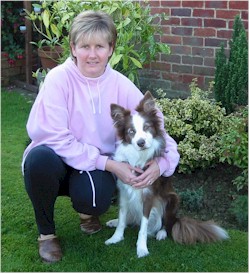 Why
Intermediate classes? Why
Intermediate classes?
From memory - and I could be wrong here - Intermediate classes were created to give
dogs, other than starters, an additional run, i.e. to be used instead of Open classes as
required. Very often shows used to schedule Starter, Novice, Open and Senior classes which
meant that starter dogs had three runs whilst novice and senior dogs had only two and I seem to
remember that causing consternation to senior/novice handlers at the time. Whilst Advanced
classes were created around/at the same time, not many were scheduled and that is still the
case. I donít include Power & Speed or Championship classes in this statement as they are quite
different.
It has been
mooted recently that Intermediate classes are a waste of time and what is the point of them.
Surely the point is that Intermediate offers all levels of dog, out of Starters, an opportunity
for a challenging, enjoyable run. Whilst some Intermediate courses might be too difficult,
thatís an entirely unrelated problem and needs to be addressed separately. The degree of
difficulty of course design isnít limited to Intermediate classes. One often sees Novice
courses which would prove challenging to a Senior partnership and so forth.
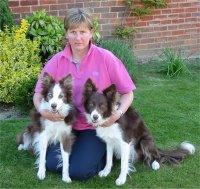 Why
remove Advanced dogs from Intermediate? Why
remove Advanced dogs from Intermediate?
If thereís an argument to remove Advanced dogs from Intermediate, then why not an
argument to remove Novice or Senior dogs instead/as well? Obviously this couldnít work as
Intermediate classes would metamorphose into Novice or Senior or classes with no entries! My
point here is why should Advanced dogs be excluded from a class which was designed for the
majority to enjoy?
It appears that
the main concern regarding Advanced dogs competing in Intermediate classes is that itís proving
too difficult for dogs to move up the ranks because itís not possible to win against Advanced
dogs. Iím not sure that removing, or excluding from, a class which is available to the majority
for different reasons - perhaps to challenge Novice dogs and give a more relaxed run to
Advanced/Senior dogs - is the right way forward.
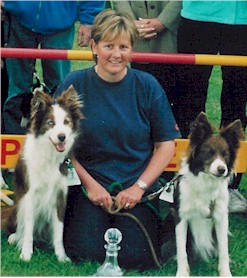 Alternatives Alternatives
Maybe we should look instead at finding different ways of moving dogs through
the ranks, i.e. by number of top three placings rather than outright wins. Maybe we should
restrict dogs to their own level i.e. novice to novice; senior to senior; advanced to advanced
and keep the intermediate class for all those levels (i.e. giving two classes per dog). Perhaps
intermediate should not count towards progression but remain just as an in-betweenie class for
all to enjoy. Iím not deliberately leaving elementary and starters out of my equation, they too
would have two runs by allowing elementary to run in elementary and starters (not novice) and
starters to take part in starter and novice classes.
Of course the
above isnít always easy for shows to schedule, but what is with the numbers weíre looking at
today? Whichever way you slice the cake, show committees will still have to scratch their
heads when scheduling classes in order to cope with numbers.
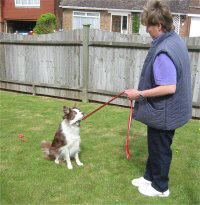 Worried
about the competition? Worried
about the competition?
Another opinion frequently voiced is that people are unhappy with their Novice dogs
having to compete against Advanced dogs. But surely the most important level for Novice dogs is
Novice and thatís where theyíre competing with/against their peers. Intermediate is another
class to have the benefit of which perhaps gives a different type of challenge to Novice
partnerships.
Personally when I have a Novice dog I
donít expect to do too well in Intermediate classes until my dog and I gain some experience. I
enjoy the Intermediate classes more because my expectations are lower whereas I get stressed by
novice classes because I want - and at some point expect them to - do well in them.
I can sympathise
with those who think itís unfair to compete against Advanced dogs but then couldnít the same be
said of Novice dogs competing against Senior dogs (would remain the case in Intermediate) and
Senior dogs against Advanced dogs (is the case in Senior classes) and so forth? Where do you
draw the line?
Another thought
is that once a dog qualifies into Advanced level by whatever means, itís going to have to
compete against the existing Advanced dogs and if it wasnít competitive against those dogs in
Intermediate, then it still wonít be when it reaches Advanced.
I have competed
at Advanced level for over 15 years with three different dogs and, as is always the case, there
is at any given time a small group of dogs and handlers who win most of the classes most of the
time, but they change because staying at the top at Advanced level is transitory and affected
not just by form and experience but by the dogís age (and possibly that of the handler!) I
would hasten to add I am not one of the small group but one of those who normally end up
unplaced in the advanced classes, tutting in the background that Iím just not quick enough!
 From
a completely personal point of view... From
a completely personal point of view...
I would hate to lose intermediate classes or be excluded from them. This view is
based around two main factors:-
-
When I have a Novice dog I like to take part in Intermediate
classes to gain experience over and above that gained from Novice classes. (This comment is
based on intermediate classes being removed altogether, as some have suggested although this
now seems unlikely).
-
I have an aging Advanced dog who is gradually winding down
but is certainly not ready to move into Veteran classes. We have a good run and great fun in
Intermediate classes. I donít want to put her over vast spreads or ask her to turn herself
inside out as is often the case in advanced classes. Indeed I enjoy intermediate courses
with my younger dog for the same reason. Just because a dog is quick enough to win
Intermediate, Open or Senior classes surely doesnít mean that it must spend the rest of its
agility career negotiating very difficult patterns? It also begs the question, why
should those who do really well in a sport lose out which I believe will be the case for
advanced dogs. Whist I believe that Advanced classes should be more challenging than Senior
or Intermediate, it's good to have a more straightforward run as well. Sure. Advanced status
is the elite of KC agility. but let's keep things in perspective. Agility to the majority is
a hobby that we enjoy with our pets regardless of what level we achieve. (This comment
is based on advanced dogs being excluded from intermediate classes.)
Over the years I
havenít often seen standard Advanced Agility or Jumping classes scheduled. They are a rarity. I
donít count Advanced Power & Speed as that is a special class and one I donít participate in
because I donít like the huge spreads (purely personal view.)
Champ classes
It is fantastic that there is now Championship, but my dogs arenít always quick
enough. We often come away with unplaced clear rounds. As placings are very limited in those
classes, it canít really count as a standard run for Advanced dogs with the normal number of
placings, trophies etc. that one would expect in a standard class.
My point here is
that whilst my dogs might have been a little quicker/luckier than some in order to win into
Advanced, they arenít different from anybody elseís dogs. I donít train them by negotiating
impossible patterns and I donít want to compete with them over impossible patterns. I want to
enjoy and for my dogs to enjoy agility as much as anyone else. I can foresee a situation when
Advanced dogs are excluded from Intermediate classes. Where a show has a Championship class
scheduled, it could well be the only choice for Advanced dogs.
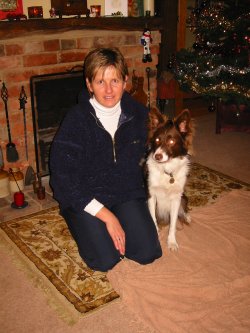 Who
do we exclude? Who
do we exclude?
In my view, if people seriously want to exclude a group of dogs from a great class,
i.e. Intermediate, then there must be something suitable for them to compete in that doesnít
involve courses which are too difficult. As already said Advanced dogs and handlers like to
have fun as much as other levels. Maybe the idea of splitting the class and letting Advanced
dogs run over the same course but in a separate competition could be the answer until such time
we manage to sort out the issues surrounding course design and the varying degrees of
difficulty etc.
Iím also aware
that there is talk of downgrading dogs to Intermediate once they become less competitive or of
a certain age, but I think that might prove difficult to administrate although it is certainly
an option. Neither option would be my personal choice as I think a generic class which is
available to all is a good thing for the sport and keeps the fun in for everyone.
In conclusion
This is a rather rambling essay for which I apologise, but I never was very good at
getting straight to the point and I didnít want this to come across as a cold bullet pointed
statement. It contains a bit of emotion as I feel very strongly and wanted that to come across.
I donít often get involved in open debate as I worry terribly about being shot down in flames
and making myself unpopular, but I felt I had to make a case for advanced dogs staying in
intermediate as there have been many statements put forward on the other side of the debate but
not many, if any, from this standpoint. If only for posterity, at least it's a different
viewpoint.
A version of this article appeared
in the agility magazines earlier this year.
|